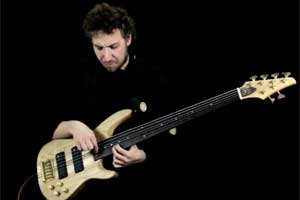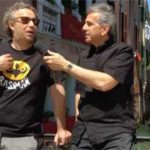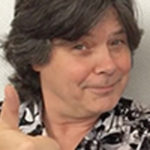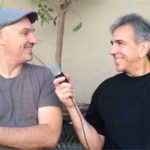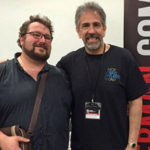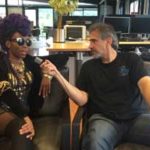Metal bassist from Italy talks about his BASStards group, collaborating with Yves Carbonne and Michael Manring and his new CD!
Exclusive interview with FBPO’s Jon Liebman
May 7, 2012
Alberto Rigoni is an Italian bass player and composer, rapidly gaining popularity on the international music scene, mostly due to his modern, original musical approach. Besides his solo career, Alberto is a member of the progressive metal band TwinSpirits, founder of the pop electro duo Lady & the Bass and co-founder, with Italian bassist Simone Vignola, of a project dubbed “The BASStards.”
Alberto has been featured at Euro Bass Day, sharing the bill with bass icons Bobby Vega, Brian Bromberg, Billy Sheenan, Pippo Matino and Maurizio Rolli. His prolific recording career includes two solo CDs, Something Different (2008) and Rebirth (2011).
FBPO: How would you describe your musical upbringing?
AR: Well, I don’t know if it’s the best way to start an interview, but I have to say I never wanted to learn music theory and I still don’t know it. I just play what I feel. My music comes from my soul. I grew up listening to different genres, from progressive rock to fusion, pop, funky, etc. Listening to all kinds of music is really important.
FBPO: How did you become a bass player?
AR: I started playing bass when I was 16 years old after a friend introduced me to Dream Theater. I was so impressed. “I wanna play DT songs,” I said. John Myung’s bass parts were very complex. That was really challenging! After some months, I was able to play different Dream Theater songs. Then I founded the DT cover band, Ascra. We played a lot of shows here in Italy.
FBPO: Italy has such a rich musical heritage. How would you say your musicianship was influenced by growing up in that environment?
AR: That’s true. Italy has so many great players! I’ve been lucky. I’ve played with many musicians and that really helped open my mind.
FBPO: Tell me about TwinSpirits.
AR: Twinspirits is a progressive rock metal band project, formed in 2004, with poly-instrumentalist Daniele Liverani. While working on the last chapter of Genius Rock Opera, Daniele felt the urge to go back to a real band combo, sharing his songwriting skills with some young musicians. Genius Rock Opera drummer Dario Ciccioni was his first choice to cover the drummer role. They were both quite shocked when they first saw Tommy Ermolli playing guitar, a 13-year-old prodigy with brilliant technique and an uncommon sense of melody! Then I joined the project.
With this four-member combo ready to take off, Daniele was still looking for a fitting singer. With his powerful voice, Danish singer Søren Adamsen was the first choice among several well-known – and unknown – auditioners from all over the world. With the team now complete, the release of a full-length album came about six months later. The Music That Will Heal The World was released by Lion Music with worldwide distribution in June 2007, followed by a promotional Italian tour in the beginning of 2008. Sadly, Søren wasn’t available for the tour. He ultimately had to quit the band for personal reasons.
In September 2008, after another stressful auditioning process, the band recruited Swedish singer Göran Nyström for his extreme versatility in both melodic and heavy musical directions. In September 2009, Twinspirits released the concept album, The Forbidden City, and toured in support for the release in some of the major clubs in Italy. In February 2011, Twinspirits struck back once again with the release of a third album, LEGACY, which included the thirty-minute suite, “The Endless Sleep,” a sort of mini-album in the album itself.
FBPO: How about Lady & the Bass? You’ve described it as “pop, with electro, funky and experimental influences, yet…original and very catchy.” What does all that mean?
AR: It’s not always easy to describe my music. I think of Lady & the Bass as a pop electro project, but since most of the tunes are composed by me, you can hear my many influences. I think the songs are easy listening and the bass makes you move!
FBPO: Your first solo CD, Something Different, features a variety of rock and funk, sometimes smooth, other times outright metal-like, all the while showcasing your very original bass playing. What were you trying to say with this album?
AR: I started composing for Something Different back in 2005, when I was alone and felt the need to make something extremely personal. From the very beginning, I didn’t want to follow any given music genre, relying exclusively on an instinctive way of composing. The only thing I was sure of was that I would come out with something progressive, given my musical roots, but at the same time, experimental.
The songs are based on melody, not on virtuosity, yet on most of the tracks, the bass has three main roles: rhythm, solos and arrangements, in order to ensure a homogeneous style. The album has both aggressiveness and sweetness, but everything rotates around melody.
FBPO: What about Rebirth?
AR: Rebirth was released in 2011 by Nightmare Records. It has a darker mood compared to my previous album. It reflects a hard time of my life that, fortunately, had a happy ending. That’s why the album alternates gloomy atmospheres with radiant ones.
On Something Different, I used a lot of drum loops and effects on bass. Rebirth is more “real,” with no drum loops, but real drummers. I used legendary Porcupine Tree drummer Gavin Harrison and Ark drummer John Macaluso. Rebirth is still progressive with many influences from rock fusion, but it’s less experimental compared to Something Different.
FBPO: You’ve been known to collaborate with other giants in the bass world, namely Yves Carbonne and Michael Manring. How do you approach those types of bass player combinations without getting in each other’s way?
AR: Michael and Yves are my idols! Their playing is unique, very different than mine. I was sure their tone was going to make a great contribution to my tunes. On “A New Soul,” Michael Manring played a part I originally thought of as a vocal part. If you hear the result, you can understand why I asked him to play. On Rebirth, I left the fretless part up to Yves Carbonne. He played exactly what I had in mind, without my having to ask him to play a specific written part.
FBPO: You seem to have a fondness for Dingwall basses. What is it about those basses that you like? Why did you choose Dingwall?
AR: I owned and tried many basses during my career. Recently I discovered Dingwall basses. Amazing! Dingwall basses are multi-scale instruments that use the Novax Fanned Fret System. For example, on my Dingwall Z3, the low B has a 37-inch scale and the tone is unbelievable, deep and clear at the same time, while the G string is 34 inches. That system allows for a perfect balance between all the strings and also a great tuning, since each string has its own scale. Great balanced tone across the strings and across the fretboard. I also own a Dingwall Prima 6-string. The sound is very elegant with great definition, and it’s amazing for solo stuff. Dingwall basses are truly revolutionary!
FBPO: Tell me about your project with Simone Vignola, the BASStards. Are you surprised no one else had already come up with that name?
AR: [Laughs] That’s a crazy name! On my first solo album, one of the songs was called “BASSex.” I’ve always liked to play with the word “bass,” so I came up with “BASStards.”
It’s a new duo I founded together with the young Italian bassist Simone Vignola. I love his playing! Since the first time we met, I thought we had many things in common. We released a single called “Obsession.” It’s a kind of electro-experimental dance/techno groove with a lot of basses! We are going to release an EP very soon!
FBPO: You’ve already done so much in the music world, yet you’re still pretty darn young! What else would you like to do that you haven’t already accomplished?
AR: Thanks a lot, Jon! You’re very kind! Well, what can I say? I hope I’ll continue making some good music!
FBPO: What would you be if you weren’t a bass player
AR: There’s probably something you didn’t know: I’m also a lawyer!
Download Alberto’s new Lady & the Bass album, “Groovy,” by clicking here.
